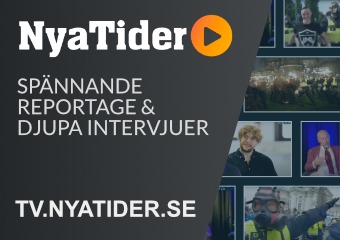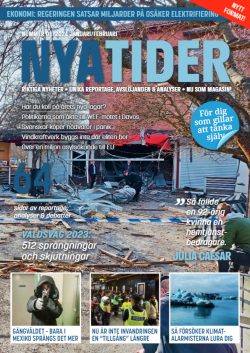During NATO’s meeting in Brussels on 19 May, the NATO countries signed the Accession Protocol for Montenegro, thus granting it observer status in the alliance. When the ratification process in Montenegro’s parliament and all the NATO countries is completed, which is expected in the spring of 2017, Montenegro will become the 29th member of NATO. After the NATO meeting, the deputy secretary of the Russian Security Council, Yevgeny Lukyanov, told reporters:
– It’s up to them [Montenegro] to decide on this. If they think that this will benefit their national security, then this is so.
New Times met the opposition politician Andrija Mandić, who has led demonstrations against NATO since the autumn of 2015. He is one of the founders of the political alliance Democratic Front, which has 20 of the 81 seats in the parliament and whose candidate scored 48.8 percent of the votes in the last presidential elections, being defeated only by a small margin.
NyT: Sweden has a complicated historical background concerning its relationship with Russia – there were a lot of conflicts and tensions, but nevertheless, Sweden tries to maintain its neutrality. At the same time – Montenegro, which has a long history, more than 300 years, of friendship with Russia – is now on its way to joining NATO. How do you see that?
The people of Montenegro are not joining the NATO camp; it is the Montenegro government, whose leader, Milo Đukanović, is blackmailed by the leadership of NATO countries. This is not a secret, and I would like to remind you that in the nineties, Đukanović was the youngest prime minister in Europe, at the age of 29! During the sanctions and then the civil war, Đukanović organized smuggling groups for illegal trade. Those groups were internationally organized criminals, tied to the Italian Mafia, which was active in Montenegro. The secret services in NATO countries were well aware of it and collected a huge amount of evidence. Besides, the privatizations of state-owned companies must be added to the list of his criminal acts. This documentary evidence was used for a “stick approach” to put pressure on him; so, he had to comply with their requests, made to further NATO interests in this area. These interests mainly centre on Montenegro being the only North Mediterranean country not in the NATO Alliance: if you start from the Atlantic, going down to the Mediterranean, from Spain up to Syria, all these countries are in NATO, except this tiny part called Montenegro.
We have no need to join NATO. On the contrary, it would have been a disgraceful act, after NATO bombed Montenegro in 1999 in the same way as it did Serbia. That was the first ever military intervention of NATO in Europe, against Serbia and Montenegro. NATO used depleted uranium, which poisoned the ground, water, air and affected the health of the whole population. Nowadays people have immeasurable health issues, caused by the criminal acts of NATO. After such an experience, it would be pure masochism from our side to join those who were killing our citizens 17 years ago.
So, this is masochism for the citizens, but not for those in power. It is their only one way to sustain their freedom – not even power, but just freedom! Otherwise Đukanović would have been arrested immediately upon entering any of the Western countries and facing a long list of charges based on the evidence of all his criminal acts that they have. That is the only reason Đukanović’s regime is pushing the people of Montenegro into NATO against their will.
NyT: Not so long ago, the opposition collected more than 50,000 signatures, to initiate a referendum. To my knowledge, the number of opposition representatives in the parliament is insufficient. Is Montenegro on an irreversible course to joining NATO? How do you see further developments in this regard?
Montenegro’s citizens have much more important issues to resolve: employment, salaries, health services, etc. The issue of joining NATO has been artificially imposed on them. That kind of decision can be resolved only by a referendum, not like the one in 2006, when the government wanted an independent Montenegro by any means. All kinds of theft happened. Brutal irregularities were effected to achieve such a goal. What we now need is a legal, fair referendum, wherein people could express their will on such an important issue. I have no doubt in my mind that the majority would reject NATO in such a large number, that afterwards, no-one would come up with the idea of asking the Montenegrin people this question ever again!
By the way, we had more then 100,000 signatures, expressing the will of the people for a referendum. But according to our Constitution it is just an opinion poll. We have the required number of representatives to start the initiative for a referendum, which is 25 representatives. Those we do have. But, to initiate a referendum, we would need a majority of the votes of the representatives, 41, and we do not have such a majority.
NyT: So, you are not sure yet if you will have a referendum?
Not having a referendum would be a huge security failure for the country. It could cause a serious crisis, with unforeseen consequences.
NyT: Does that mean you will insist on a referendum?
Yes, but I have to emphasize: only a fair, legal one, not just any kind of referendum, but a referendum with the results accepted from both sides.
NyT: Is there in Montenegro a rule of law, freedom of speech and has the government of Montenegro indeed followed the so-called European values, which are so important for the European Union and NATO?
No! The current Montenegrin regime is the same kind of regime as in 1945, when communists took power. It did not transform, nor after 1989 either, when communist youth with Milo Đukanović took power from the elder and much more experienced communists. The way of governing hasn’t changed and everything is still the same – with a single difference: theatrical performance for the public with so-called democratic rhetoric. In this way, you have an image of Montenegro as if it were a democracy. But, if you scratch under the surface, you will find all the mechanisms of a totalitarian society we already had in Montenegro before we installed the multi-party system. The prerequisite for Montenegro becoming a democracy is a change of government, first of all. For the last few hundred years, Montenegro has had violent changes of power. We have not experienced, yet, the meaning of democratic standards or democratic elections. All the mechanisms of the present government are concealed, so there is no chance for democratic standards.

NyT: But are there freedom of speech and free media, so-called Western-European values? I have heard that even your immunity was lifted?
There is a judicial proceeding against me, since I was leading the demonstrations last September until 24 October, when they were brutally shattered. The legal proceedings are still going on. I have no confidence in Montenegro’s judiciary. It is totally controlled by the dictator of Montenegro. He will do everything to harm me personally in my political activities, and the political movement I belong to. So, everything is set up to serve one single person. That person is under the control of the international secret services of NATO countries. They give him the legitimacy, and therefore they decide what direction Montenegro has to take. Đukanović meets their demands and gets in return the approval of Brussels, despite the total absence of democracy. So, they are recognizing the Montenegro state as a democratic society with freedom of the press, freedom of speech, many political parties participating in elections, etc. … But, one should see what kind of elections we get here! Brussels has got all the evidence of election thefts, but they are not interested in seeing them. They advise us to resolve it within the institutions of our system, which means going to Đukanović, who is the reason for the problem in the first place! There you may see the double standards of Europeans, treating the same kind of problem differently in the Balkans, from one Balkan country to the other, according to their needs.

NyT: Montenegro and Western officials often claim Moscow plays a leading role in the crisis and protests in Montenegro. There are talks about Russian influence here. How active is Russia really here, and, did you receive personal support from Russia, as a leader of the pro-Russian opposition political party?
Historically, Montenegro owes a huge debt of gratitude to Imperial Russia for surviving during the Ottoman Empire. Tiny Montenegro would never have survived without military, financial and all other kinds of support from the mighty Russian Empire. Nowadays, the influence of Russia in Montenegro is minimal. The ambassador of Hungary is more influential here then Russia as a whole! It is not only due to the anti-Russian politics of the government, but also to the passive role of the Russian state towards developments in Montenegro. We have had only a few statements from the Russian government about respecting the will of the majority of the Montenegrin people and about protecting its own national interests. As to the protests we had against the government, there was no help whatsoever from Russia, nor support. If those protests had been in favour of Brussels or Washington, I am sure there would have been huge media, financial, security, police and other kinds of support, as we saw in Serbia in 2000. Here, the opposition did everything on its own. We think that Montenegro should be governed by its own citizens, not by anyone from outside.
But I would like to express my own opinion on Russia. Personally, I would like to see more Russian influence here, at least as much as from the countries who have never been friends but enemies, who have been killing the people of Montenegro! We have never had anything but friendship and help from Russia. It would only be natural to have much more Russian influence!
NyT: What are the causes of the political crisis in Montenegro now and how do you see future developments? Would it be resolved by parliamentary elections in October, or, what would be your prognosis?
The crisis we have here is tremendous: moral, political, economic, spiritual, literally of all sorts. Montenegro is divided, there is a desire to make a Latin American society out of it! There is a desire to rule the citizens of Montenegro under a colonial system. There are enormous differences between the government and the opposition, the real opposition. This is the opposition that wants to change the government, not the one ready to serve them! I think we shall win, as we stand for justice, truth, tradition and everything else Montenegro always has! The moment will come when all the evil things that we are going through with this regime, will go away.
NyT: Geopolitically, what is your view on the solution of problems in Montenegro? Will Montenegro join NATO or not?
Montenegro should be neutral. As a small country, it should stand together with other militarily neutral countries, under the supervision and guarantee of more powerful countries or entities, such as the EU, the USA, and most of all, for us, traditional Serbs and Montenegrins of Montenegro, the guarantee of Russia, with all the powers at her disposal.
Concluding Remarks by Sergey Belous
According to independent sociological research conducted last year, the idea of Montenegro joining the North Atlantic Alliance is supported by only 31 per cent of the population, and an even smaller number of the respondents — 9 percent — were in favour of anti-Russian sanctions (against such sanctions were 69 percent). Nevertheless, the number of Montenegrins desiring EU integration, constitutes the majority at the moment — 62 percent. It is this “European bait” that the current authorities are using, insisting on the idea that the way to the European Union runs through NATO and that joining the Alliance will provide for a good investment climate.
































